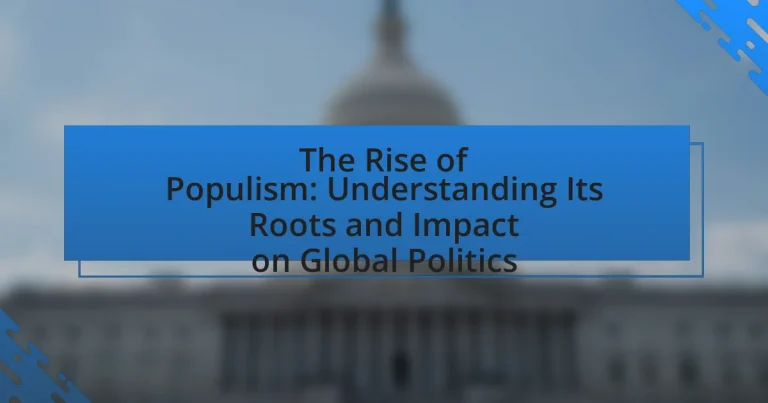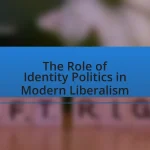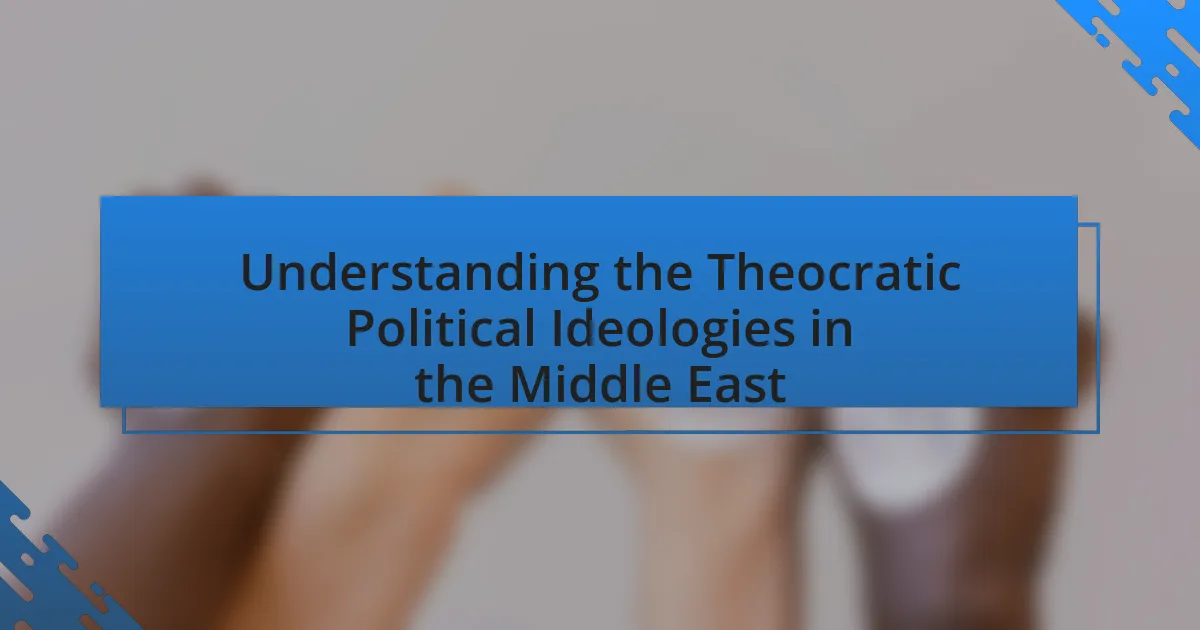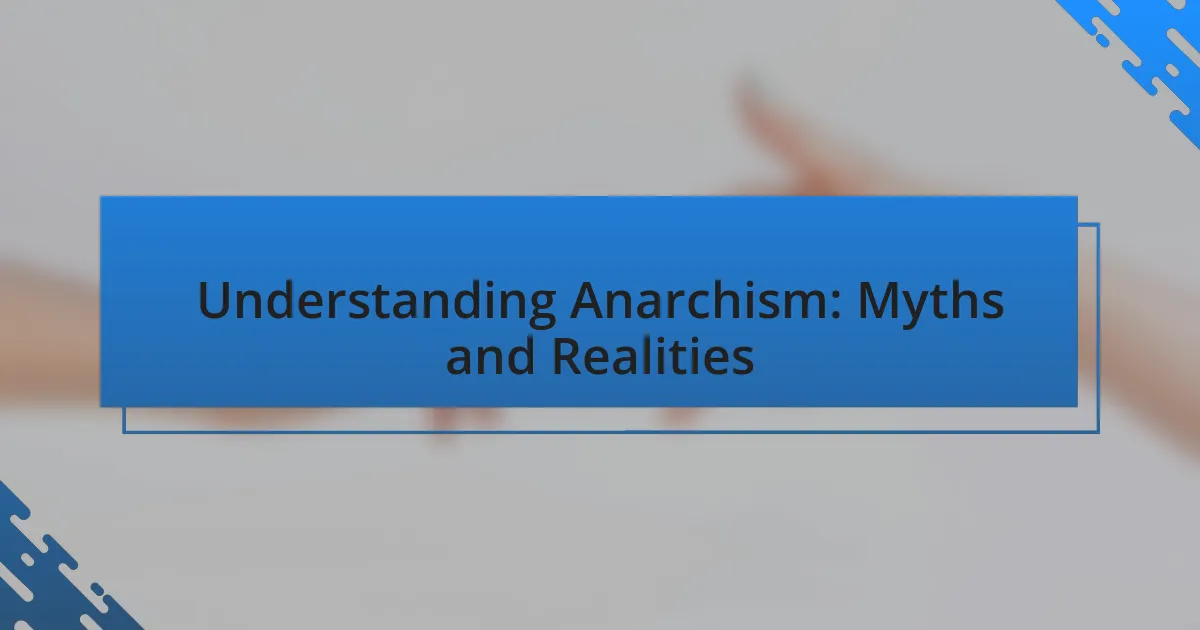Populism is a political approach that seeks to represent the interests of ordinary people against a perceived elite, gaining traction due to factors such as economic inequality, political disenfranchisement, and cultural backlash against globalization. The article explores the definition of populism, its key characteristics, and historical factors contributing to its rise, including the impact of economic crises and social media. It also examines the implications of populism on global politics, traditional political parties, and democratic institutions, while discussing future trends and strategies to address the challenges posed by populist movements. Understanding these dynamics is crucial for fostering political stability and promoting inclusive governance.
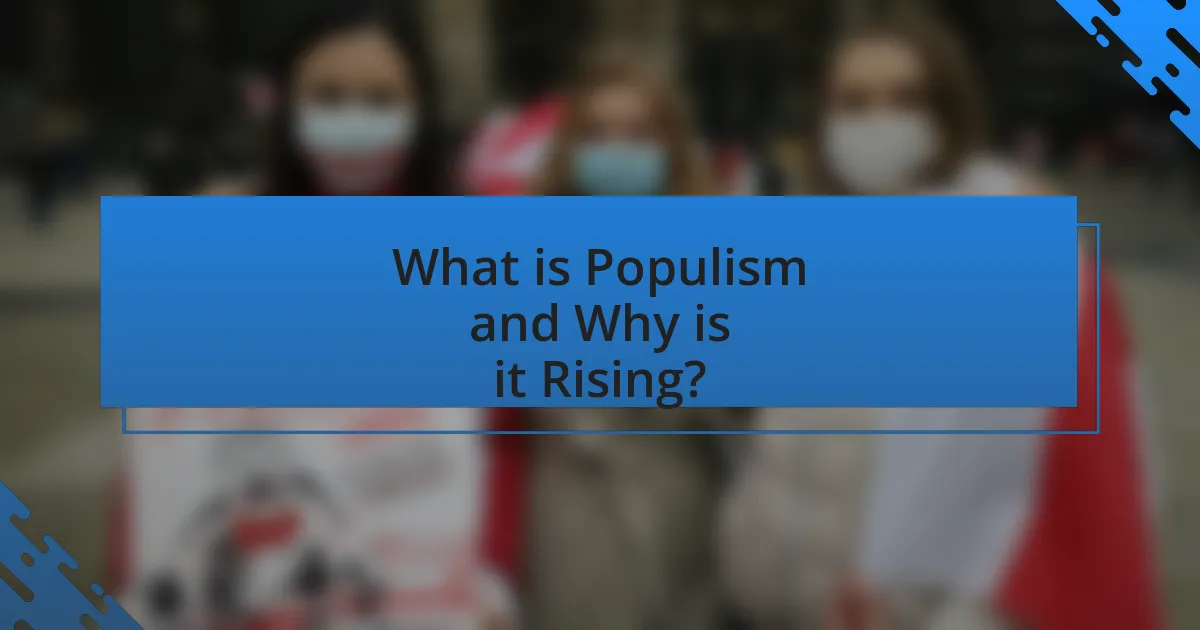
What is Populism and Why is it Rising?
Populism is a political approach that seeks to represent the interests of ordinary people, often contrasting them against a perceived elite or establishment. Its rise can be attributed to various factors, including economic inequality, political disenfranchisement, and cultural backlash against globalization. For instance, the 2008 financial crisis exacerbated economic disparities, leading to increased support for populist leaders who promise to prioritize the needs of the common citizen over elite interests. Additionally, surveys indicate that many voters feel disconnected from traditional political parties, which has fueled the appeal of populist movements across various countries.
How do we define populism in a political context?
Populism in a political context is defined as a political approach that seeks to represent the interests and concerns of ordinary people, often contrasting them against a perceived elite or establishment. This definition is supported by the observation that populist movements typically emerge during times of social or economic distress, where leaders claim to give voice to the marginalized and disenfranchised. Historical examples include the rise of leaders like Hugo Chávez in Venezuela and Donald Trump in the United States, who both positioned themselves as champions of the common people against established political systems.
What are the key characteristics of populist movements?
Populist movements are characterized by their appeal to the common people against the elite, emphasizing a dichotomy between “the people” and “the elite.” These movements often utilize charismatic leadership, mobilizing emotions and grievances to galvanize support. Additionally, populist movements typically advocate for direct democracy and may reject established political institutions, claiming they are corrupt or unresponsive to the needs of the populace. Historical examples include the rise of leaders like Hugo Chávez in Venezuela and Donald Trump in the United States, both of whom capitalized on widespread discontent with traditional political systems to gain power.
How does populism differ from other political ideologies?
Populism differs from other political ideologies by emphasizing a dichotomy between “the people” and “the elite,” positioning itself as a movement that claims to represent the common citizen against established institutions. Unlike ideologies such as liberalism or conservatism, which focus on specific economic or social policies, populism is more about the style of politics and rhetoric, often characterized by charismatic leadership and direct appeals to the masses. Historical examples include leaders like Hugo Chávez in Venezuela and Donald Trump in the United States, who utilized populist rhetoric to mobilize support by portraying themselves as champions of the ordinary people against corrupt elites. This focus on the perceived will of the people, often bypassing traditional political structures, sets populism apart from more structured political ideologies.
What historical factors have contributed to the rise of populism?
The rise of populism has been significantly influenced by historical factors such as economic inequality, political disenfranchisement, and cultural backlash. Economic inequality, particularly during periods of financial crises, has led to widespread discontent among the lower and middle classes, who feel marginalized by elite interests. For instance, the 2008 financial crisis exacerbated wealth disparities, prompting populist movements that promised to address the grievances of the economically disadvantaged.
Political disenfranchisement has also played a crucial role; when citizens perceive that traditional political parties fail to represent their interests, they often turn to populist leaders who claim to speak for the “common people.” The decline of trust in established institutions, as evidenced by declining voter turnout and increased polarization, has further fueled this trend.
Cultural backlash against globalization and immigration has contributed to the rise of populism as well. Many individuals feel threatened by rapid social changes and perceive that their cultural identity is under siege, leading them to support populist agendas that promise to restore national sovereignty and cultural values. Historical events, such as the Brexit referendum in 2016, illustrate how cultural concerns can galvanize populist sentiments.
These factors collectively create an environment ripe for populism, as they resonate with the frustrations and aspirations of large segments of the population.
How have economic crises influenced populist sentiments?
Economic crises have significantly amplified populist sentiments by creating widespread discontent and distrust in established political institutions. During economic downturns, such as the 2008 financial crisis, unemployment rates soared, and many individuals faced financial insecurity, leading to a perception that traditional political elites failed to address their needs. This disillusionment often drives voters toward populist leaders who promise to prioritize the interests of the “common people” over the elite. For instance, in the aftermath of the 2008 crisis, countries like Greece and the United States saw a rise in populist movements, with parties like Syriza and figures like Donald Trump gaining traction by capitalizing on economic grievances and advocating for radical change.
What role does social media play in the spread of populism?
Social media significantly facilitates the spread of populism by providing a platform for direct communication between populist leaders and their supporters. This medium allows populist figures to bypass traditional media gatekeepers, enabling them to disseminate their messages rapidly and widely. For instance, during the 2016 U.S. presidential election, Donald Trump utilized Twitter to engage with voters, shaping public discourse and rallying support without relying on conventional news outlets. Research indicates that social media can amplify populist sentiments by fostering echo chambers, where like-minded individuals reinforce each other’s beliefs, as seen in studies by the Pew Research Center, which highlight the role of social media in creating polarized political environments.
Why is populism gaining traction in various regions globally?
Populism is gaining traction globally due to widespread dissatisfaction with traditional political elites and institutions. This discontent is often fueled by economic inequality, cultural anxieties, and a perceived disconnect between the government and the populace. For instance, the 2008 financial crisis led to significant economic hardship for many, resulting in a loss of trust in established political parties. Additionally, the rise of social media has enabled populist leaders to communicate directly with citizens, bypassing traditional media filters and amplifying their messages. Countries like Brazil, Hungary, and the United States have seen populist movements flourish as leaders capitalize on these sentiments, promising to represent the “common people” against the elite.
What demographic groups are most likely to support populist leaders?
Demographic groups most likely to support populist leaders include working-class individuals, rural populations, and those experiencing economic insecurity. Research indicates that these groups often feel marginalized by traditional political elites and are drawn to populist rhetoric that promises to address their grievances. For instance, a study by Inglehart and Norris in “Trump, Brexit, and the Rise of Populism” highlights that economic distress and cultural backlash significantly influence support for populist movements, particularly among voters with lower educational attainment and those residing in economically depressed areas.
How do cultural and national identities impact the rise of populism?
Cultural and national identities significantly impact the rise of populism by fostering a sense of belonging and defining in-group versus out-group dynamics. Populist movements often capitalize on cultural grievances, portraying themselves as champions of the “common people” against perceived elites who threaten traditional values and national identity. For instance, the rise of populist leaders in Europe and the United States has been linked to a backlash against globalization, immigration, and multiculturalism, which many citizens feel undermine their cultural heritage. Research by Cas Mudde and Cristóbal Rovira Kaltwasser highlights that populism thrives in contexts where cultural identity is perceived to be under threat, leading to increased support for populist parties that promise to restore national and cultural integrity.
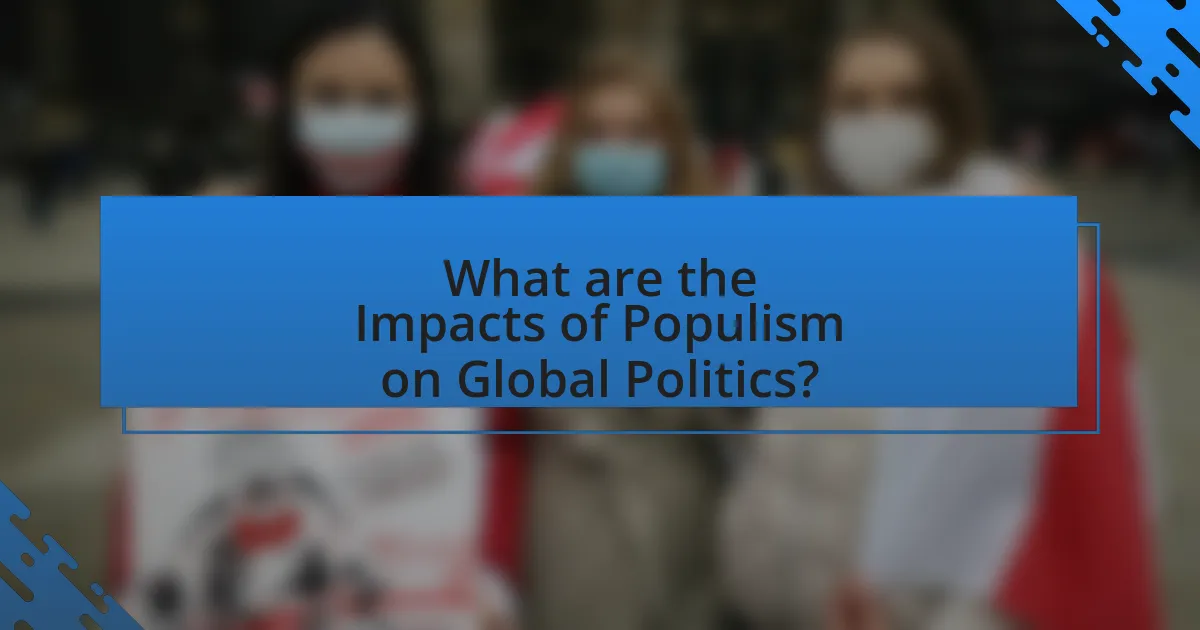
What are the Impacts of Populism on Global Politics?
Populism significantly impacts global politics by reshaping political discourse, altering party dynamics, and influencing policy-making. It often leads to the polarization of societies, as populist leaders typically frame politics as a struggle between the “elite” and the “common people.” For instance, the rise of populist movements in Europe and the Americas has resulted in increased support for nationalist policies, as seen in Brexit and the election of Donald Trump in 2016. These events illustrate how populism can disrupt traditional political alliances and challenge established institutions, leading to a decline in trust in democratic processes. Furthermore, populism can affect international relations by promoting isolationist policies, as evidenced by the U.S. withdrawal from various international agreements under populist leadership.
How does populism affect traditional political parties?
Populism significantly alters traditional political parties by challenging their established ideologies and structures. This shift often leads to the fragmentation of party systems, as populist movements attract disillusioned voters who feel neglected by mainstream parties. For instance, in countries like Italy and Hungary, populist parties have gained substantial electoral support, undermining traditional parties’ dominance and forcing them to adapt their platforms to regain relevance. The rise of populism has also prompted traditional parties to adopt more populist rhetoric and policies in an attempt to reconnect with their base, as seen in the responses of established parties in various European elections.
What challenges do established parties face from populist movements?
Established parties face significant challenges from populist movements, primarily due to the erosion of traditional voter bases and the rise of anti-establishment sentiments. Populist movements often capitalize on public discontent with the political elite, leading to a shift in voter loyalty. For instance, in the 2016 U.S. presidential election, Donald Trump’s populist campaign attracted disaffected voters from the Republican Party, demonstrating how established parties can lose support to populist candidates. Additionally, populist movements frequently utilize social media to mobilize grassroots support, which established parties may struggle to counteract effectively. This dynamic creates an environment where established parties must adapt their strategies to address the concerns of a changing electorate, often leading to internal divisions and a reevaluation of core policies.
How do populist leaders reshape political discourse?
Populist leaders reshape political discourse by prioritizing direct communication with the public and framing issues in a way that emphasizes a divide between “the people” and “the elite.” This approach often involves simplifying complex political issues into binary choices, which resonates with a broad audience. For instance, leaders like Donald Trump in the United States and Jair Bolsonaro in Brazil have utilized social media platforms to bypass traditional media, allowing them to present their narratives unfiltered. This strategy not only mobilizes support but also alters the language and tone of political debates, often leading to a more confrontational and polarized environment. Research indicates that such leaders frequently employ emotionally charged rhetoric, which can shift public opinion and redefine political norms, as seen in the rise of anti-establishment sentiments across various democracies.
What are the implications of populism for democracy?
Populism can undermine democracy by eroding institutional checks and balances. Populist leaders often prioritize direct appeals to the public over established democratic norms, which can lead to the concentration of power and the marginalization of opposition voices. For instance, in Hungary, Prime Minister Viktor Orbán has implemented measures that weaken judicial independence and restrict media freedom, demonstrating how populism can facilitate authoritarianism under the guise of representing the “will of the people.” This trend poses significant risks to democratic governance, as it can result in the dismantling of democratic institutions and the erosion of civil liberties.
How does populism influence voter engagement and participation?
Populism significantly increases voter engagement and participation by appealing directly to the concerns and emotions of the general populace. This political approach often emphasizes a dichotomy between “the people” and “the elite,” which can mobilize individuals who feel marginalized or disillusioned with traditional political systems. For instance, research conducted by the Pew Research Center in 2019 found that populist movements in various countries led to higher voter turnout, particularly among younger demographics who felt their voices were not being heard. This engagement is often driven by populist leaders who utilize charismatic communication and social media to foster a sense of community and urgency around political issues, thereby encouraging more citizens to participate in elections and political discourse.
What risks does populism pose to democratic institutions?
Populism poses significant risks to democratic institutions by undermining the rule of law and eroding checks and balances. Populist leaders often prioritize their agenda over institutional integrity, leading to the concentration of power and the weakening of judicial independence. For instance, in Hungary, Prime Minister Viktor Orbán’s government has systematically dismantled democratic norms, curtailing media freedom and altering electoral laws to entrench his party’s dominance. This trend can result in the marginalization of opposition voices and the erosion of civil liberties, ultimately threatening the foundational principles of democracy.
How does populism impact international relations?
Populism significantly impacts international relations by fostering nationalism and undermining multilateral cooperation. Populist leaders often prioritize national interests over global collaboration, leading to strained diplomatic ties and increased protectionism. For instance, the rise of populist movements in countries like the United States and Brazil has resulted in a retreat from international agreements, such as the Paris Climate Accord and the Trans-Pacific Partnership, which are crucial for global governance. This shift can destabilize existing alliances and create an environment of uncertainty in international markets, as seen during the trade tensions initiated by populist rhetoric.
What changes in foreign policy can be observed in populist governments?
Populist governments typically exhibit a shift towards nationalism in their foreign policy, prioritizing domestic interests over international cooperation. This change is often characterized by a reduction in multilateral engagements, as seen in the United States under Donald Trump, who withdrew from the Paris Agreement and the Trans-Pacific Partnership, emphasizing “America First” policies. Additionally, populist leaders frequently adopt a confrontational stance towards traditional allies and international institutions, reflecting a skepticism of globalization and a preference for bilateral agreements that they perceive as more beneficial to their nation. This trend is evident in Brazil under Jair Bolsonaro, who aligned closely with the U.S. while distancing from regional partnerships. Such foreign policy changes are often justified by populist leaders as necessary to protect national sovereignty and economic interests, resonating with their domestic support base.
How does populism affect global cooperation on issues like climate change?
Populism negatively affects global cooperation on climate change by prioritizing national interests over collective action. Populist leaders often reject international agreements, viewing them as threats to sovereignty, which undermines collaborative efforts essential for addressing global issues like climate change. For instance, the withdrawal of the United States from the Paris Agreement under a populist administration exemplifies how such political movements can disrupt international climate commitments, leading to decreased funding and support for global initiatives. This trend is supported by research indicating that populist rhetoric often emphasizes short-term economic gains, further complicating long-term environmental strategies.
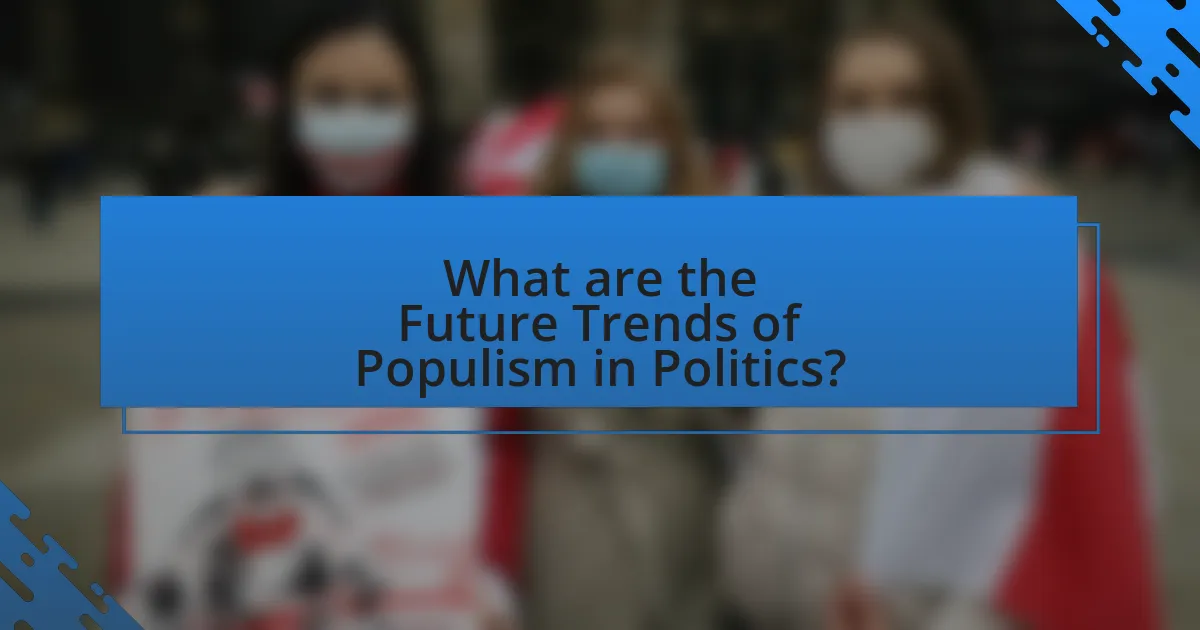
What are the Future Trends of Populism in Politics?
Future trends of populism in politics indicate a rise in digital populism, characterized by the use of social media to mobilize support and disseminate populist messages. This trend is supported by the increasing reliance on online platforms for political engagement, as seen in recent elections where candidates utilized social media to connect directly with voters, bypassing traditional media channels. Additionally, populism is likely to become more transnational, as global issues such as immigration and economic inequality resonate across borders, leading to the formation of international populist movements. This is evidenced by the collaboration of populist parties in Europe and the Americas, which share common goals and strategies. Furthermore, the ongoing economic challenges and discontent with established political institutions will likely fuel populist sentiments, as seen in the aftermath of the COVID-19 pandemic, where many citizens expressed dissatisfaction with government responses.
How might populism evolve in the coming years?
Populism is likely to evolve by becoming more digitally driven and increasingly focused on local issues. As technology advances, populist movements will leverage social media platforms to mobilize support and disseminate their messages more effectively, similar to how movements like the Tea Party in the United States utilized online platforms in the early 2010s. Additionally, the growing discontent with traditional political elites may lead populist leaders to emphasize grassroots campaigns that address specific community concerns, reflecting a shift from broad national narratives to localized agendas. This evolution is supported by the rise of regional populist parties in Europe, which have gained traction by focusing on immigration and economic inequality, demonstrating that populism can adapt to the changing political landscape.
What factors could lead to a decline in populist movements?
Factors that could lead to a decline in populist movements include economic stability, increased political engagement, and the effectiveness of traditional political parties. Economic stability reduces the appeal of populist rhetoric that often capitalizes on economic grievances; for instance, countries experiencing low unemployment rates and steady growth tend to see a decrease in populist support. Increased political engagement, particularly among younger voters, can counter populist narratives by fostering a more informed electorate that values democratic processes. Additionally, traditional political parties that adapt their platforms to address the concerns of the populace can reclaim support, as seen in various European nations where established parties have successfully integrated populist issues into their agendas, thereby diminishing the influence of populist movements.
How could emerging technologies influence the future of populism?
Emerging technologies could significantly influence the future of populism by enhancing communication and mobilization capabilities for populist movements. Social media platforms, for instance, allow populist leaders to bypass traditional media, directly engaging with supporters and disseminating their messages rapidly. This direct communication can amplify populist narratives, as seen in the 2016 U.S. presidential election, where social media played a crucial role in Donald Trump’s campaign, enabling him to reach millions without the filter of mainstream media.
Additionally, data analytics and targeted advertising can help populist movements identify and exploit voter sentiments, tailoring messages to resonate with specific demographics. Research from the Pew Research Center indicates that social media has become a primary source of news for many, particularly younger voters, which populist leaders can leverage to shape public opinion and mobilize support effectively. Thus, the integration of emerging technologies into political strategies is likely to bolster the reach and impact of populism in the future.
What strategies can be employed to address the challenges posed by populism?
To address the challenges posed by populism, governments and political institutions can implement inclusive policies that prioritize social equity and economic opportunity. These strategies include fostering open dialogue between political elites and citizens to rebuild trust, enhancing civic education to promote critical thinking, and addressing economic disparities that fuel populist sentiments. For instance, research indicates that countries with strong social safety nets and equitable economic policies tend to experience lower levels of populism, as seen in the Nordic model, which emphasizes welfare and social cohesion. By focusing on these strategies, political entities can mitigate the appeal of populism and promote a more stable democratic environment.
How can traditional parties adapt to the rise of populism?
Traditional parties can adapt to the rise of populism by embracing more inclusive and responsive policies that address the concerns of disillusioned voters. This adaptation involves actively engaging with grassroots movements and incorporating their demands into party platforms, thereby bridging the gap between traditional political structures and the populist sentiment. For instance, research indicates that parties that prioritize economic inequality and social justice, as seen in the rise of left-wing populism in various countries, can regain voter trust and support. Additionally, traditional parties can enhance their communication strategies to better resonate with the electorate, utilizing social media and direct outreach to counter populist narratives effectively.
What role can civil society play in countering populist narratives?
Civil society plays a crucial role in countering populist narratives by fostering democratic engagement and promoting critical discourse. Organizations within civil society, such as NGOs, advocacy groups, and community organizations, can educate the public about the dangers of populism, which often relies on misinformation and divisive rhetoric. For instance, research by the International Institute for Democracy and Electoral Assistance highlights that civil society initiatives can enhance political literacy, enabling citizens to critically assess populist claims and engage in informed discussions. Additionally, civil society can mobilize grassroots movements that advocate for inclusive policies, thereby countering the exclusionary tendencies often present in populist agendas.
What lessons can be learned from the rise of populism?
The rise of populism teaches that political discontent often stems from economic inequality and a perceived disconnect between elites and the general populace. Historical examples, such as the election of Donald Trump in the United States and the Brexit referendum in the United Kingdom, illustrate how populist movements can capitalize on frustrations regarding job loss, immigration, and globalization. These events highlight the importance of addressing the concerns of marginalized groups to prevent the emergence of populist sentiments. Additionally, the rise of populism underscores the need for political leaders to engage with citizens transparently and authentically, as failure to do so can lead to a loss of trust in traditional political institutions.
How can understanding populism help in fostering political stability?
Understanding populism can help foster political stability by addressing the underlying grievances of the populace and promoting inclusive governance. When political leaders comprehend the motivations and concerns that drive populist sentiments, they can implement policies that resonate with the needs of the majority, thereby reducing polarization. For instance, research indicates that countries with responsive governance that acknowledges populist demands often experience lower levels of civil unrest and greater public trust in institutions. This connection between understanding populism and political stability is evident in cases where governments have successfully integrated populist narratives into mainstream politics, leading to enhanced social cohesion and reduced conflict.
What best practices can be implemented to promote inclusive governance?
To promote inclusive governance, best practices include ensuring diverse representation in decision-making processes. This can be achieved by implementing policies that mandate the inclusion of marginalized groups, such as women, ethnic minorities, and the economically disadvantaged, in political and administrative roles. Research indicates that countries with proportional representation systems, like Sweden and Rwanda, have higher rates of female participation in governance, leading to more comprehensive policy-making that addresses a wider range of societal needs. Additionally, fostering public engagement through participatory budgeting and community consultations enhances transparency and accountability, as evidenced by successful initiatives in Brazil and Canada, which have empowered citizens to influence local governance directly.
